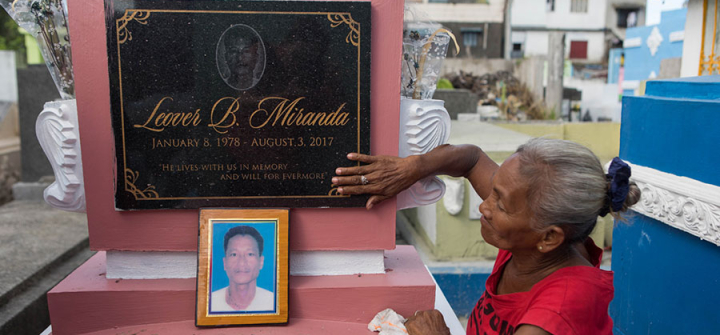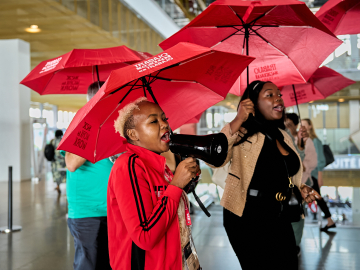Elderly Mothers Bear the Emotional Burden of the Drug War
This is Part I of a special series for Global Health NOW by Ana P. Santos, an independent journalist based in Manila, Philippines, featuring photography by Amanda Mustard. Read Part II, Mothers Coping with Prolonged, Complicated Grief, here.
MANILA—Every day Elvira Miranda lays out a sachet of coffee, a tetra pack of juice and a packet of biscuits in front of a photo of a man in a white t-shirt. “Please watch over me. Don’t let me die yet. I still have to look after my grandchildren—your children,” she implores.
The photo is all Miranda, 70 years old, has now of her son, Leover, who was shot and killed during anti-drug police operations on August 3, 2017 in Manila North Cemetery, one of the city’s largest burial grounds and home to some 6,000 families like Miranda’s.
Drug raids were frequent in the Manila North Cemetery then. Residents were on high alert for the revving of motorcycles and thumping of boots announcing the arrival of the police. Chaos would ensue, sending residents scrambling into hiding. There would be shouted accusations and pleas, gunshots—then silence. Police justified anyone they killed with 3 words: “They fought back.”
The drug bust was part of a brutal crackdown on narcotics launched by Rodrigo Duterte in 2016 to fulfill the campaign promise that won him the presidency. Slum communities like the Manila North Cemetery, identified as hotspots for crime and drug use, became one of the de facto frontlines of a bloody drug war, killing mostly poor young men suspected of being involved in drugs.
The government tally of the drug war is over 5,000 dead. Activists and opposition leaders say the body count is likely higher than 20,000 from a combination of police operations and vigilante killings by masked assailants.
But no one has counted the collateral damage of this drug war—including the elderly mothers left behind like Miranda, shouldering a heavy burden of guilt and emotional trauma.
By Miranda’s account, Leover, 39 at the time he was killed, was not even living in Manila North—just visiting his mother the day he died. He was taking a nap when a scuffle broke out among the neighbors amid the raid. When he went out to see what was going on, the police asked him if he was a resident, seeking proof he was not selling or doing drugs. He called for Miranda to vouch for him, but she was hiding and did not hear him.
The next thing she knew, Leover was dead.
Days after she buried her son, Miranda remained in a daze, but she would snap out of it when she saw groups of young people loitering around the cemetery. Overcome with rage, she would curse at them, “You! You are the drug users the police were after. The police should have killed all of you instead of my son.”
Close to 2 years after Leover’s death, when she tells this story, Miranda is at first edgy and bitter—then resigned.
“I was always angry then, always looking for a fight. I wanted to get mad at someone. Now, there’s nothing more I can do. I’m old. I’m alone.”
The death of a child is a tragedy for any parent, at any age. But losing a child later in life leaves a parent exposed to physiological and emotional vulnerabilities. While the official age people are classified as elderly varies per country some experts peg it at retirement age—which is around 60-65 years old in the Philippines.
It is an age when few of life’s comforts remain to make the loss of a child easier to bear for a parent. The prospect of having more children is gone; often there is no partner to share the emotional burden. If they have other children, they are usually grown and busy struggling to raise their own families.
At the same time, the physical effects of aging can complicate recovery as well.
“The regenerative capacity of bones, brain and nerves slows down when you age. There is the natural wear and tear of the body. Body functions like recognition, memory and even coping mechanisms are impaired,” says Hany Ibrahim, a consultant geriatrician and fellow at Global Brain Health Institute in Dublin.
The addition of a major traumatic experience like the sudden violent death of a child brings grief that may be prolonged and intense. “For sure, these women will experience some kind of post-traumatic stress disorder, depression and anxiety. These are all psychiatric illnesses that, if not addressed, could be hard to recover from,” said Ibrahim.
This impact could be more pronounced in marginalized communities exposed to what Ibrahim referred to as cumulative stressors like poverty, lack of access to health services and abject living conditions.
Compounded sorrow and hardship
Bianca Franco, a researcher at the Ateneo de Manila University, spent months in communities terrorized by the drug war from mid-2017 to early 2018. Franco and a team of researchers interviewed about 20 women—sisters, widows, mothers aged 18 to 83—who lost loved ones in the drug war through police anti-drug operations or vigilante killings. The mothers bore the brunt of the emotional and financial loss.
“Some held their sons in their arms as they took their last breath. Based on what we saw, a sudden and violent death is tougher to move on from than a natural death. Their sons had been dead for a year or more, but these mothers wept like it happened yesterday,” said Franco.
Most of these mothers were retired or no longer worked as much because their sons provided for them. “Their death left not only an emotional void but the financial strain of making it from one day to the next. It left some of them with grandchildren to take care of,” said Franco.

Carmelita Bajacan, 60, also lives in the Manila North Cemetery, just a few yards away from Miranda. Her 37-year-old son, Irish, was shot 5 times and died a police operation in the Philippines. Image by Amanda Mustard for Global Health NOW.
Carmelita Bajacan, 60, also lives in the Manila North Cemetery, just a few yards away from Miranda. Her 37-year-old son, Irish, was shot 5 times and died during the same police operation as Miranda’s boy, Leover.
Both Miranda and Bajacan are left to care for the children their sons left behind on their meager income from cleaning the crypts that they live in and from other odd jobs like washing clothes of other residents.
Miranda’s son left behind 4 children ages 15-19. Though they’re mostly grown, Miranda feels she has to take on the role of primary guardian for them. Leover and his wife became estranged when she left the Philippines to work abroad; she has since remarried.
Bajacan helps support Irish’s widow, May Canary, and their 8-month old child, Angelo.
Her tiny hut, home to 4 other family members, is built over Irish’s grave. Months after his death, a large tarpaulin of Irish’s death announcement—traditionally used in the Philippines to signal a wake’s location—still hangs over it. “At least I can still be with him,” said Bajacan.
The International Women’s Media Foundation supported the reporting for this story.
Join the tens of thousands of subscribers who rely on Global Health NOW summaries and exclusive articles for the latest public health news. Sign up for our free weekday enewsletter, and please share the link with friends and colleagues: http://www.globalhealthnow.org/subscribe.html
Elvira Miranda lovingly touches the grave of her son, Leover, killed in the Philippines drug wars. Image by Amanda Mustard for Global Health NOW.




